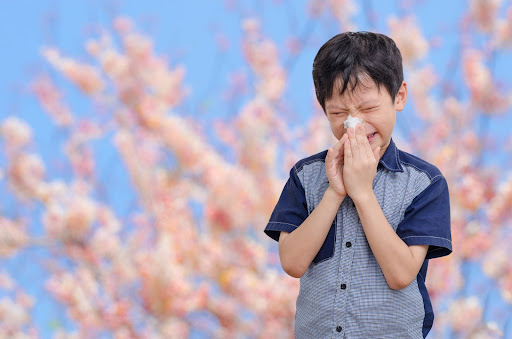Late February marks the start of allergy season here in North Carolina, with the peak being between April and May. More than 60 million Americans experience allergies each year which can wreak real havoc on day-to-day responsibilities. Luckily, there are steps you can take to minimize your symptoms this allergy season.
Seasonal Allergies
Allergies arise when your immune system is faced with a foreign substance, such as pollen, dust, or dander. Your body views these substances as an invader and produces antibodies to protect us from these unwanted visitors, causing a series of reactions. Some common symptoms of seasonal allergies include congestion, sneezing, itchy eyes, nose, and throat, post-nasal drip, coughing, and fatigue. Here at Wake Forest Pediatrics, we’re offering our favorite tips and tricks to beat this year’s allergy season.
- Drink Fluids
Histamine works in an attempt to protect the body from allergens. Drinking plenty of water will help prevent higher histamine production, which can alleviate allergy symptoms. In addition, drinking fluids helps to improve almost all of your body’s normal functioning resulting in flushing the system, avoiding dehydration, and even boosting mood.
- Exercise
When you’re feeling stuffed up and bogged down during allergy season, exercise may be the last thing on your mind. However, exercise can actually help to calm your allergy symptoms. A study conducted by the National Library of Medicine found those who did 30 minutes of cardio three times a week for eight weeks showed significant improvement in their symptoms. However, ensure that you and your child aren’t outside during the peak allergy time of the day, which falls around midday or early afternoon. If possible, try to opt for indoor activities like shooting hoops or having a dance party.
- Use Air Conditioning
During peak allergy season, it’s best not to invite allergens into your home. One of the best ways to do this is to keep your windows closed and run the air conditioning. If the pollen count is high and your windows are open, there is a high chance the allergens will find their way into your home, worsening your symptoms. Another way to keep allergens out is to remove your shoes and clothes as soon as you get home and shower at night to rinse off any remaining allergens
- Stay In The Know
One of the best ways to combat this allergy season is to stay in the know. The pollen count is a measure of pollen grain per cubic meter and is used to forecast the chance that people suffer from symptoms when they are exposed to outdoor air. When the pollen count is high, it is recommended to stay indoors or to manage your symptoms with over-the-counter medications.
Over-the-counter remedies such as Zyrtec, Allegra, and Claritin are great options for minimizing allergy season-related symptoms. Always consult your child’s pediatrician before using any of these medications. To see the allergy forecast near you, check out this resource: https://www.zyrtec.com/allergy-forecast
- See Your Child’s Pediatrician
Some of the most common allergy symptoms in children include a stuffy nose, sneezing, red and watery eyes, asthma symptoms, hives, an itchy rash, and dry skin. These allergic reactions are often caused by grass and weed pollen, trees, dust mites, or molds. For diagnosis of allergies in your children, your child’s pediatrician will run a skin test, blood test, or food challenge test. When the allergies are identified, your pediatrician will then work with you and your child to come up with a treatment plan.
The providers at Wake Forest Pediatrics are committed to providing our patients with a medical home throughout all the stages of adolescence. If you have questions about your child’s health or more ways to beat allergy season, call our Wake Forest office at 919-556-4779 or our Knightdale office at 919-266-5059 to make an appointment.




